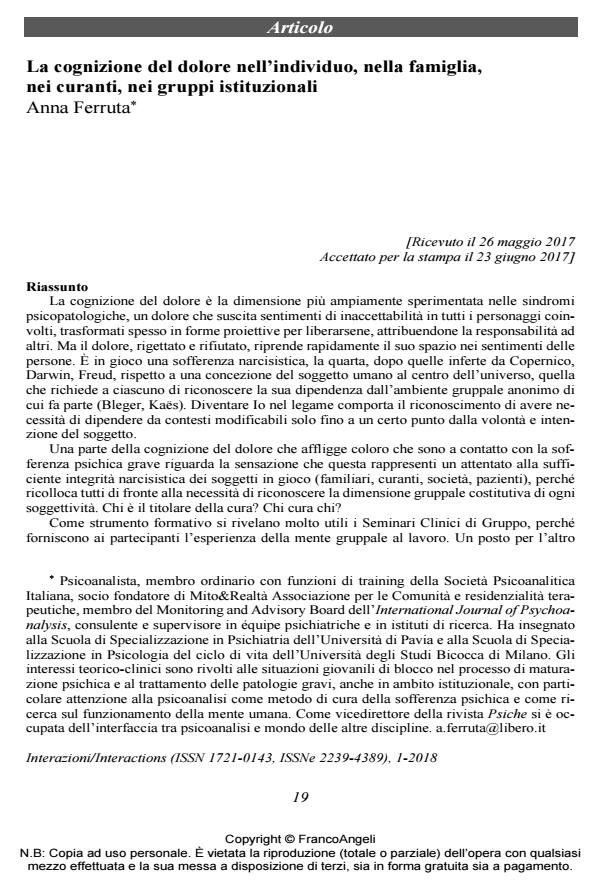The cognition of pain in individuals, the family, in caregivers, institutional groups
Journal title INTERAZIONI
Author/s Anna Ferruta
Publishing Year 2018 Issue 2018/1
Language Italian Pages 12 P. 19-30 File size 162 KB
DOI 10.3280/INT2018-001002
DOI is like a bar code for intellectual property: to have more infomation
click here
Below, you can see the article first page
If you want to buy this article in PDF format, you can do it, following the instructions to buy download credits

FrancoAngeli is member of Publishers International Linking Association, Inc (PILA), a not-for-profit association which run the CrossRef service enabling links to and from online scholarly content.
The cognition of pain is the most widely experienced dimension in psychopathological syndromes, a pain which provokes feelings of unacceptability in all the individuals affected. These feelings are often transformed into projective forms in an attempt to be free of them, attributing the responsibility to others. But rejected and refused pain rapidly reclaims its space. It is a question here of a narcissistic wound, the fourth one after those inflicted by Copernicus, Darwin and Freud, regarding a conception of the human subject who perceives him/herself as the centre of the universe, forcing him/her to recognise their emotional dependence on the anonymous groupal environment to which they belong (Bleger, Kaës). Becoming oneself in the relationship implies acknowledgment of the need to depend on contexts which are only to a certain extent modifiable by a subject’s will and intention. Part of the cognition of the pain which afflicts those in contact with serious psychic suffering regards the sensation that this suffering represents an attack on the sufficient narcissistic integrity of the subjects involved (families, caregivers, society, patients), because they are all forced to acknowledge the groupal dimension which is a constituent part of every subjectivity. Who is the recipient of the treatment? Who is treating who? Group Clinical Seminars are seen to be very useful as training tools, because they offer participants the experience of groupal mentality at work. Recognising a place for the other in oneself does not constitute a depressogenic wound for healthy narcissism, on the contrary it potentiates it. There is always something "other", there is always someone to receive and learn from.
Keywords: Pain, psychopathology, environment, group, training, narcissism, depression
- Astori S., Ferruta A., Mariotti C. (2015). La diagnosi genetica: un dialogo per la cura. Milano: FrancoAngeli.
- Badaracco J.E.G., Narracci A. (2010). La psicoanalisi multifamiliare in Italia. Torino: Antigone.
- Balint M., Balint E. (1968). La regressione. Milano: Raffaello Cortina, 1983.
- Bleger J. (1967). Simbiosi e ambiguità. Loreto: Libreria Editrice Lauretana, 1992.
- Di Chiara G. (1985). Una prospettiva psicoanalitica del dopo Freud: un posto per l’altro. Rivista di Psicoanalisi, 31: 451-461.
- Ferruta A. (2013). Come lavora il pensiero gruppale in differenti situazioni cliniche. In Gabbriellini G. (a cura di), Il pensiero gruppale nel lavoro con il paziente, nella supervisione, nei servizi. Pisa: Felici.
- Ferruta A. (2016). L’istituzione necessaria. Funzione Gamma, rivista online, 36.
- Ferruta A., Foresti G., Vigorelli M. (2012). Le Comunità Terapeutiche. Psicotici, borderline, adolescenti, minori. Milano: Raffaello Cortina.
- Frances A. (2013). Primo: non curare chi è normale. Contro l’invenzione delle malattie. Torino: Bollati Boringhieri.
- Freud S. (1916). Una difficoltà per la psicoanalisi. OSF, vol. 8. Torino: Bollati Boringhieri.
- Kaës R. (2002). La polifonia del sogno. Roma: Borla, 2004.
- Kaës R. (2007). Un singolare plurale. Roma: Borla, 2007.
- Panksepp J., Biven L. (2012). Archeologia della mente. Milano: Raffaello Cortina, 2014.
- Salomonsson B. (2007). “Talk to me baby, tell me whats the matter now”. Semiotic and developmental perspectives on communication in psychoanalytic infant treatment. Int J Psychoanal, 88, 1: 127-146. DOI: 10.1516/04P3-FUER-0U41-LLN8
- Winnicott D.W. (1969). Sum, io sono. In Winnicott D.W. (1986), Dal luogo delle origini. Milano: Raffaello Cortina, 1990
Anna Ferruta, La cognizione del dolore nell’individuo, nella famiglia, nei curanti, nei gruppi istituzionali in "INTERAZIONI" 1/2018, pp 19-30, DOI: 10.3280/INT2018-001002